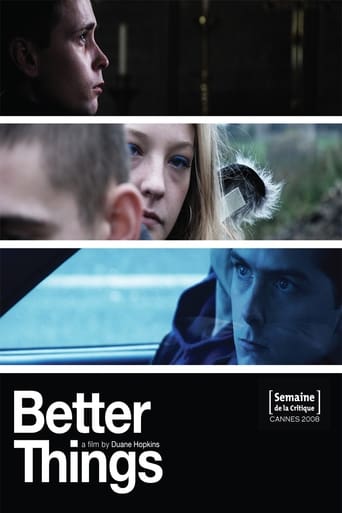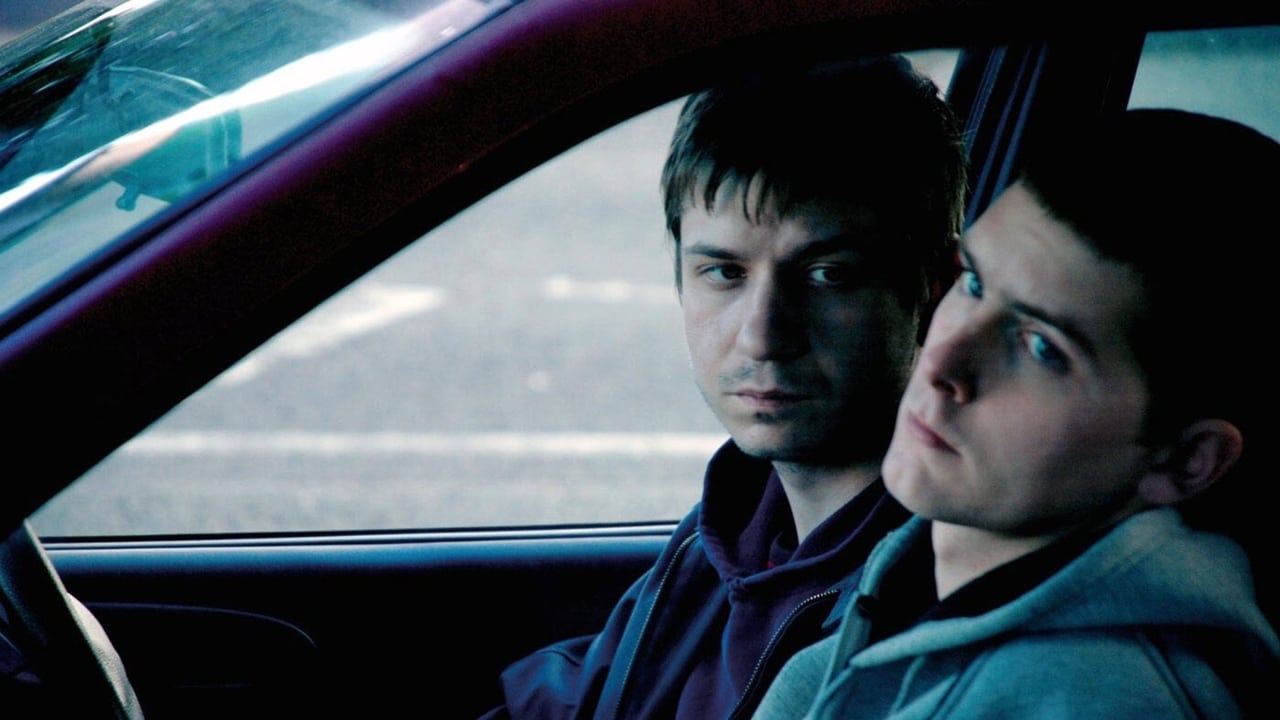thecatcanwait
Three times i've seen this without being able to write about it. Watching it feels as painful as the pain its trying to show."It hurts when we love somebody. Because loving is a painful thing. That is its nature. Our loving is hurting us" reads dumpy adolescent Gail (what is the book? My guess is R D Laing) "Love hurts" is the over-riding (sometimes overbearing) theme of the film. The thematic treatment supplants any kind of plot or through-run story.Therefore condense drama to concentrate emotion: still the life, compose the frame, minimalise the dialogue. No panning or tracking or moving off with camera. Stay still. Be here. With this that hurts. The effect is to feel oppressively overloaded on monochromal, monotonal, misery.This is all stylistically engaging. Racing in the car fast down a dark country lane; all the sound is cut except for the 2 boys talking – like being immersed inside the bubble of them, cut off from the outside, focused right in to the heart of their isolation.Better Things is relentlessly, almost - courageously - grim. A lot of very miserable face going on. Faces without smiles, without warmth, lacking, unwarmed by love. Faces of lads are all so null and void its hard to distinguish one from the other.All is shadow and blue inertia, with very little light to provide contrast.This isn't so much about the perils of doing drugs. It's about how difficult it is to love when love feels out of reach. Deprived of love, life disappears, becomes denuded – gets gloomily unbearable. Seems to be the message.Disturbingly, the setting isn't inner-city London, Manchester – but the least place you'd expect to see urban anomie and alienation, – the supposedly "lovely" Costwolds.I'll be saving this film. Doubt I'll want to watch it another 3 times though.
Chris Knipp
The photographer and filmmaker Duwne Hopkins' Better things is rather ironically titled: its people are hardly moving toward improvement in their bleak lives, though they might like to. They live in a marginal community in the English Cotswolds that seems to be dominated by adolescents and old people. All of them are either depressed, or addicted to drugs, or just old, run down, idle, or lost. Most are desperately hoping for love, but unable to find it. Hopkins, who has made some celebrated short films on related topics, is a native of the area and is careful to use local people, including former drug addicts. Faces seem harshly real, light is sculpted, landscape panoramas are dark and painterly.The shock here is that we're in the lovely English countryside, but it's full of urban problems: poverty, unemployment, drug addiction. There is no Hollywood glamor or Trainspotting wild style about these young addicts. The eye is poetic but the stories are sociological realism.A young woman named Tess (Emma Cooper) dies of an overdose, and those who remain don't seem better off, with a few exceptions: an estranged old couple gradually becomes reconciled, a girl overcomes her fear of leaving her room, and the boyfriend screws up the courage to visit the dead girl's mother.That boyfriend, Rob (Liam McIlfatrick), as well as David (Che Corr) and Jon (Freddie Cunliffe) all did heroin with Tess, although David, due to the influence of girlfriend Sarah (Tara Ballard), is half-heartedly trying to stop. Rob is struggling, not least with his inability to attend Tess's funeral because of his complicity in her death. Jon's grandfather (Frank Bench) is released from the hospital and when he returns home--in some of the bleakest scenes of marital shutdown ever filmed--avoids his poor old wife (Betty Bench). His anger is never explained, but he does eventually let it go. Tess's friend Gail (Rachel McIntyre) missed the funeral because she has become phobic about leaving her room. Her grandmother (Patricia Loveland) has a hard time getting her to get up in the morning. She is taking a new medication, a therapist or social worker makes a home visit, and she improves after a look at the stormy fields and trees outside with her failing "nan." The plot lines include 18 characters. As one reviewer has noted, the three young male leads are hard to tell apart; and so are some of the names. The meandering sequences tend to seem random, even when artificially linked by sound or image.Despite the integrity, something is missing--perhaps just stylistic restraint. Blue-tinted, carefully planned images of inertia are jarred awake by abrupt shock editing in which cross-cutting of similar moments and shifts from silence to noise are used a little too freely. I began to think the film would have worked better if the main stories had been followed through in separate sections instead of shuffled together--if, in short, Hopkins had worked in a simpler documentary style, let characters and scenes play out, and made space for more motivation and movement than simply waiting to score or racing at breakneck speed on a country road. The stylistically overwrought manner doesn't allow sequences and characters to breathe and detracts from the authenticity of the content, which, however mired in stasis, seems richly textured. There is a talent here that is at war with itself.Shown in March 2009 as part of the Film Comment Selects series at Lincoln Center, New York.
come2whereimfrom
'Better Things' is Duane Hopkins bleak but brilliant directorial debut set in rural Britain. It tells a series of stories against a backdrop of a countryside that, far from idyllic, has become a wash with drugs, death, intrigue and teenage angst. Shot beautifully any single frame from the first ten minute sequence could be a photograph in an exhibition, as too could certain shots right the way through this movie. Cold and almost bleached out you can really feel the grey and the pain as we get snapshots of peoples lives, people affected by death, drug abuse, isolation, frustration, its not the easiest watch but like last years 'Hunger' it deals with dark subject matter and turns it into a thing of random beauty. Hopkins draws from his cast of first timers a sense of the real like we are privy to their lives and watching a documentary of sorts. But it's in the spaces in-between where the films real strength lie giving the viewer only part of the story and leaving the feverish mind to fill in the gaps. Take for example the old couple, she asks her husband at one point if he will forgive her but you never find out what for, it is probably not as bad as you think it is or maybe its worse. These spaces are like the gaps between verses and choruses in songs, places to let the piece breathe and ultimately they are essential to the overall film. Like peeking through the curtains at the seedy underbelly of Britain 'Better Things' wont be to everybody's taste but anyone who likes a well paced and superbly shot meditation should check it out, a great first film that should see Hopkins move onto bigger and better things.
beatmcmanus-1
...Bruno Dumont. I've read a lot of reviews lauding this supposedly great example of British art-house cinema. Even Sight and Sound made it film of the month. But the facts are simple, everything about it says the filmmaker is in thrall to the work of Bruno Dumont, particularly La Vie de Jesus and L'Humanite. And why not, they are magnificent films.Unfortunately it only goes to highlight the miserable state of British art-house and British film-making in general that this is held up as a fine example of it when all it does is rip off the style and downbeat content of Dumont's great works. For the unforgiving Northern France landscape of Dumont substitute the Cotswolds and you've got it.In fact its worth pointing out that the similarities in the prolonged static widescreen shots and the dull grey cinematography, so perfectly mimic L'Humanite especially that one would almost believe the filmmaker had had the audacity to give the colourist a copy of that film and then have him match the shots one by one.But no filmmaker could be that cynical or unoriginal. Could they? 2 stars for the perfectly copied photography.


 AD
AD



